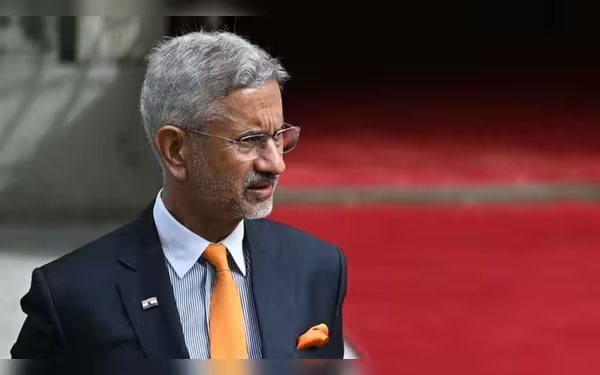Sunday, October 6, 2024 12:31 AM
Jaishankar Accused of Transnational Terrorism in Open Letter to Blinken
- Pannun alleges Jaishankar's involvement in anti-Khalistan terror.
- U.S. indictment highlights India's transnational repression.
- Protests erupt against Jaishankar's policies in Washington.
 Image Credits: geo
Image Credits: geoGurpatwant Singh Pannun accuses India's Jaishankar of transnational terror in a letter to Blinken, raising concerns over human rights violations.
In recent developments, the issue of transnational terrorism has taken center stage, particularly concerning the actions of India's Minister for External Affairs, S. Jaishankar. Pro-Khalistan separatist Gurpatwant Singh Pannun has made serious allegations against Jaishankar, claiming that he is involved in a campaign of terror against Sikhs advocating for the creation of an independent Khalistan. This accusation was articulated in an open letter addressed to Antony Blinken, the United States Secretary of State.
Pannun, who serves as the General Counsel for the Sikh For Justice (SFJ), has survived multiple assassination attempts orchestrated by Indian authorities. In his letter, he highlighted the Modi government's "policy of violent transnational repression" against pro-Khalistan Sikhs, asserting that such actions not only threaten the lives of these individuals but also challenge the sovereignty of the United States.
In November 2023, the U.S. Department of Justice filed an indictment against Indian national Nikhil Gupta, who allegedly hired assassins to murder a New York-based attorney associated with the SFJ. This incident underscores the extent of India's alleged transnational repression, which Pannun claims extends beyond American borders, affecting Sikhs in countries like Canada, the UK, Australia, and Pakistan.
Pannun's letter further emphasizes that despite the Biden Administration's commitment to prosecuting those involved in the "Murder For Hire" plot, Indian officials, including Prime Minister Modi and National Security Advisor Ajit Doval, have reiterated their intention to continue their oppressive policies. Modi's declaration in June 2024, where he stated that his government would pursue a policy of "Ghar Main Ghus Ke MarenGe" (We will enter your home and kill you), has raised alarms about the potential for increased violence against dissenters.
As the international face of the Modi government, Jaishankar is accused of attempting to justify these aggressive policies through backdoor diplomacy. Pannun warns that any further quiet diplomacy with India regarding these issues may only embolden the Indian government to continue its threats against American citizens.
In a related protest, pro-Khalistan Sikh activists gathered outside the Carnegie Endowment for International Peace Centre, where Jaishankar was speaking. The demonstrators chanted slogans such as "Kill Modi politics" and "Hindutva terror," forcing the minister to exit through a backdoor. This protest highlights the growing discontent among Sikhs regarding the Indian government's treatment of their community.
As the situation unfolds, it is crucial for the international community to pay attention to these allegations of transnational repression. The protection of life, liberty, and freedom of expression is a fundamental value that should not be compromised for economic or trade benefits. The ongoing tensions between the Indian government and pro-Khalistan activists raise important questions about human rights and the responsibilities of nations to protect their citizens from foreign threats. The world watches closely as these events develop, hoping for a resolution that respects the rights and freedoms of all individuals involved.













